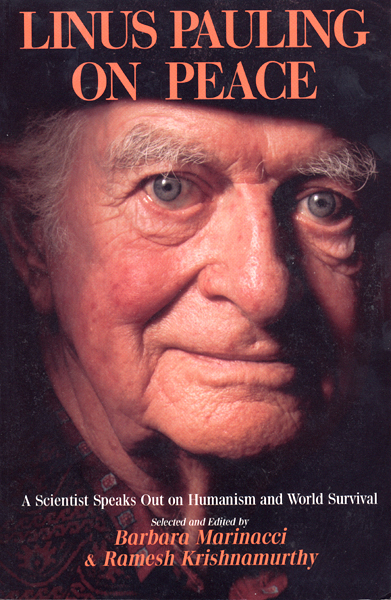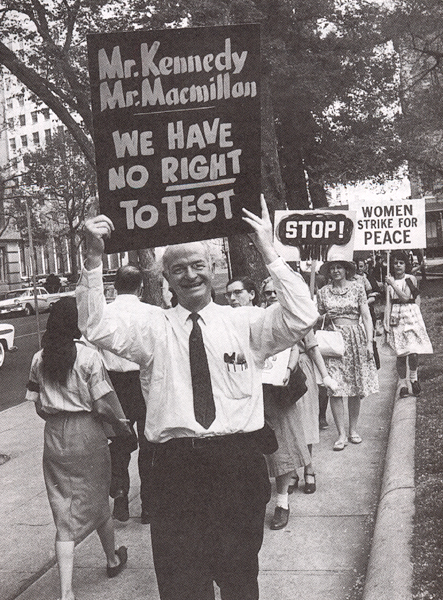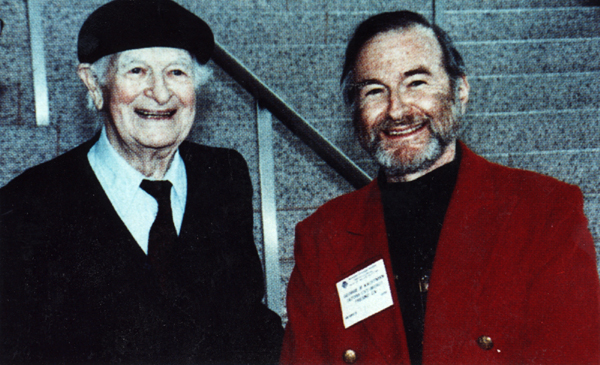|
|
Vol. 4 Iss. 5 The Chemical Educator © 1999 Springer-Verlag New York, Inc. |
ISSN 1430-4171 |
|
|
Vol. 4 Iss. 5 The Chemical Educator © 1999 Springer-Verlag New York, Inc. |
ISSN 1430-4171 |
Book Review
Linus Pauling on Peace: A
Scientist Speaks Out on Humanism and World Survival
Selected and Edited by Barbara Marinacci and Ramesh Krishnamurthy
Reviewed by
George B. Kauffman and Laurie M. Kauffman
California State
University Fresno , Fresno, CA 93740-8034
georgek@csufresno.edu

Linus Pauling on Peace: A Scientist
Speaks Out on Humanism and World Survival; Selected and
Edited by Barbara Marinacci and Ramesh Krishnamurthy. Rising Star
Press: P.O. Box BB, Los Altos, CA, 94023, USA. Rising.Star.Press@Worldnet.ATT.net , 1998. 296 pp, 15.0 × 22.7 cm. $17.95
softcover. ISBN 0-933670-03-6.
As we approach the millennium it is appropriate that we consider and reflect upon the multifaceted activities and contributions of Linus Pauling, whose life spanned virtually the entire 20th century. Pauling was born in Portland, Oregon on February 28, 1901 and died of cancer on his ranch near Big Sur, California on August 19, 1994. His life, both scientific and personal, was characterized by controversy, and almost everything about him was larger than life. The only person to have received two unshared Nobel Prizes (chemistry, 1954; peace, 1962), this internationally acclaimed scientist, educator, humanitarian, and political activist was characterized by the magazine New Scientist as one of "the twenty greatest scientists of all time, on a par with Newton, Darwin, and Einstein." He has been called one of the two greatest scientists of the 20th century (Einstein was the other) as well as the greatest chemist since Antoine-Laurent Lavoisier, the 18th-century founder of modern chemistry. His magnum opus, The Nature of the Chemical Bond (1939) is considered one of the most influential and frequently cited scientific books of our century. His advocacy of megadoses of vitamin C for the common cold, cancer, and AIDS is the controversial work for which he is best known to the general public.
Less well known to both laypersons and many scientists, however, is Pauling's evolution, encouraged by his wife, from an ivory-tower scientist to an ardent and articulate public spokesman on technological issues and the social responsibility of scientists. The book under review is dedicated "To the Memory of Ava Helen Miller Pauling, without whose influence there would have been no Linus Pauling on Peace." Early in Pauling's long and brilliant career he made a moral choice to devote half his time to working for world peace. According to his eldest son and namesake, Linus Pauling, Jr., M.D., who wrote the introduction, "My father devoted a large portion of his life to this urgent educational campaign - through hundreds of speeches, articles, debates, and interviews. His personal impact on public opinion is incalculable."
Shortly before his death Pauling wrote, "Up to now .... there have been no general anthologies of my written words to provide lay readers with an overview of the many different interests that I have pursued during my lifetime." Fortunately, in the following year Barbara Marinacci, a consultant with the Linus Pauling Institute of Science and Medicine who knew Pauling personally for many years (she is the sister of his son-in-law) and was editor of his book No More War! (Dodd, Mead & Co., 1958, 1964, 1983), produced a representative anthology of excerpts, about one-fifth published there for the first time, ranging from a sentence to several pages in length, from more than 100 sources, including publications and a number of unpublished manuscripts, notes, and interviews. The book, Linus Pauling in His Own Words: Selections from His Writings, Speeches, and Interviews (Simon & Schuster, 1995), was begun before Pauling's death, and he provided the introduction.
Unfortunately, because this anthology included all major fields of Pauling's endeavors, only about a quarter of his activities on behalf of peace, which he considered among the most important of his contributions to humanity, could be included. In Marinacci's words, "there just wasn't enough space for most of Pauling's words regarding peace, humanitarianism, and the scientist's essential role in society, along with his observations about and proposed solutions to serious world problems. That's why I wanted to do this second book now - apart from the fact that it was Pauling's own first preference."
For this new anthology, Linus Pauling on Peace, Marinacci collaborated with Ramesh Krishnamurthy in selecting, arranging, and annotating the material to make it more accessible and engrossing. Her Indian-born coeditor is Project Director of the Oregon State University Library Special Collections, where he has been working with the Ava Helen and Linus Pauling Papers since 1989. He is also editor of The Pauling Symposium (Oregon State University Press, 1996) and an activist in organizations involved in international peace, security, environmental issues, and human rights. The book was published to coincide with the opening of "Linus Pauling and the Twentieth Century," an international multimedia exhibit sponsored by Soka Gakkai International, which debuted in San Francisco in September 1998 and is scheduled to travel to various cities around the world - a highly appropriate tribute to this world traveler and world-peace advocate.

Although Pauling accomplished great and wonderful things and acquired world renown, it is indeed unfortunate that, because of his political activities on behalf of civil rights, nuclear disarmament (which earned him the Nobel Peace Prize), and world peace, he was denied research grants and his passport, was persecuted by the FBI and other governmental agencies, was defended and supported only halfheartedly by the California Institute of Technology (to which he devoted almost four decades of his life), and was snubbed by the American Chemical Society (which he had served as President in 1949). All these activities and more are chronicled in his own dynamic and inspiring words in this anthology. His battles with political and ideological enemies, although eventually resulting in his ultimate vindication, consumed much of his time and energy. In his wife's words, "It is just a shame for Linus to be wasting his talents in this way." However, Pauling was willing to pay the price; he stated unequivocally, "I have not regretted my peace activism, although this has damaged my reputation as a scientist among certain people and institutions."
Because all readers, especially younger ones, may not be familiar with the periods in which Pauling voiced his diverse political stands, Marinacci and Krishnamurthy provide introductions to the book's six principal parts - "Education and Science in a Democracy" (25 pp, the shortest section), "War, Peace, and Dissent" (35 pp), "In the Nuclear Age (45 pp, the longest section), "Peace through Humanism" (33 pp), "The Scientist in Society" (39 pp), and "Future Prophecies" (41 pp) - as well as commentaries preceding the more than 60 individual selections. Also, selections by Pauling, "Prelude: A Scientist's World" (from No More War!, the source of many of the selections) and "Postlude: Make Your Voice and Vote Count!" (from a commencement address given at Cook College, Rutgers University) precede and follow the principal parts. A 15-page "Interlude: Partnership in Life and Peace Work: Ava Helen and Linus Pauling," featuring Pauling's own words about his crucial partner in his humanitarian and social activism and their family life is included between Parts II and III.
Since the book is intended for a general rather than a scholarly readership, the editors have made minor editorial changes to reduce redundancies, added transitional words or sentences, blended individual fragments, and employed italics and different fonts for clarity. Although sources for the selections are not always identified in the text, they are listed in a separate seven-page section titled "Notes on Sources." The editors have also provided an insightful six-page foreword summarizing Pauling's life and career, a useful eight-page timeline of Pauling's "peace, political, and humanitarian activities and awards," along with "Selected References" (2 pp) containing items from 1922 to as late as 1995, and a handy eight-page double-column index.
Twenty-two photographs of Pauling throughout various stages of his life (ten were selected by his daughter Linda Pauling Kamb), some with posters in peace marches or with other pacifists such as Albert Schweitzer, Bertrand Russell, and the Dalai Lama are provided. Ironically, one shows Pauling and his wife dancing at a banquet given in 1962 to honor the United States' Nobel laureates by President John F. Kennedy in the White House, outside of which, earlier that same day, they had picketed to protest Kennedy's resumption of nuclear testing.
This vivid self-portrait of an extraordinary scientist and humanist who possessed one of the greatest minds of our time makes a perfect complement to Marinacci's first anthology as well as to the full-length biographies such as Thomas Hager's Force of Nature: The Life of Linus Pauling (Simon & Schuster, 1995) or Ted and Benjamin Goertzel's Linus Pauling: A Life in Science and Politics (BasicBooks, 1995) that appeared shortly after Pauling's death. It would be unfortunate indeed if, because it is published by a small press with limited advertising opportunities, it fails to receive the publicity and exposure that it so richly deserves.

Linus Pauling (left) with the author of this review.
It is interesting to speculate what further discoveries Pauling might have made had he not been deflected from his goals by shortsighted, self-serving, mercenary, or jealous opponents. He never, however, became embittered. In one of his last interviews (April 1, 1994), in response to our question as to how he was able to retain his positive outlook on life, he told us, "I suppose it's partially genetic ... actually the result of my having been pretty successful in my own career, and, of course, my feeling that we ought to be smart enough, we human beings, to solve our problems, whatever they are."
In his day, as Marinacci and Krishnamurthy's anthology makes evident, Linus Pauling bravely and vigorously opposed the Korean War, the various Arab&endashIsraeli wars, the Grenada and Panama "strikes," the Vietnam War, the Persian Gulf War, and other conflicts with the courage and passion of an Old Testament prophet. As we conclude this review, war rages in the Balkans and other places around the globe. The need for abiding world peace is as urgent as it ever was during Pauling's lifetime, and we are now sorely in need of his courageous and outspoken clarion voice.